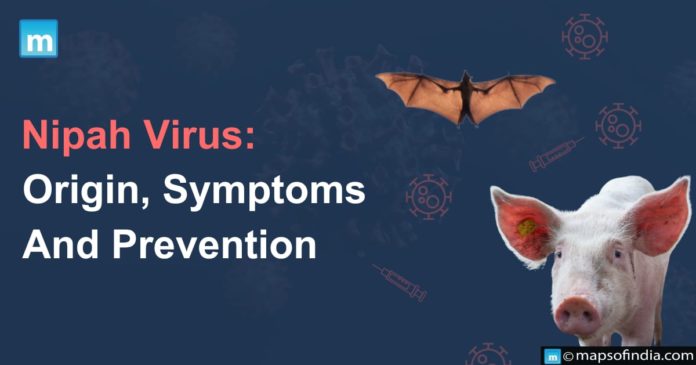On September 12, 2023, two people died from the virus in a private hospital in Kozhikode, Kerala. Kerala Health Minister Veena George said that this variant of the Nipah virus is less infectious but has a very high mortality rate. People are being tested for the virus throughout the state, and several villages have been declared contaminated zones. So, what is the Nipah virus causing such a stir in the state? Let’s take a closer look.
What is the Nipah Virus?
Nipah virus (NiV) is a bat-bourne, zoonotic virus that can cause an infection in animals and humans. It is named after the Nipah River in Malaysia, where it was first identified in 1999.
The Origin and History
The Nipah virus is thought to have originated in fruit bats, specifically the Pteropus genus. These bats can be found in Bangladesh, India, Malaysia, Singapore, and other tropical and subtropical parts of Asia. The first human cases of Nipah virus infection were reported in Malaysia in 1999. Consumption of tainted date palm sap, a delicious liquid drawn from palm plants, was the outbreak’s primary cause. The sap was tainted by infected bats’ saliva or urine.

Since the 1999 outbreak, there have been several other cases of Nipah virus in Asia, including outbreaks in Bangladesh in 2001, 2007, 2018, 2021, and 2023, and in India in 2001, 2007, 2018, 2019, and in 2023.
Symptoms
The symptoms of Nipah virus infection can vary from mild to severe. The signs and symptoms might resemble the flu or the common cold in mild cases. Some symptoms include fever, headache, cough, sore throat, and muscle aches. However, encephalitis, a disorder that causes brain inflammation, may be present in severe cases as one of the symptoms. Encephalitis can lead to coma and death. A severe Nipah virus infection can cause convulsions, altered mental status, and breathing issues.
Prevention
Several things can be done to prevent the spread of the virus, including:
- Avoid contact with sick animals, especially fruit bats.
- Wash hands thoroughly after contact with animals or their secretions.
- Avoid consuming raw date palm sap or other foods contaminated with bat droppings.
- Practicing good hygiene, such as covering your mouth and nose when coughing or sneezing.
- Avoiding contact with sick people in areas that are declared contaminated zones.
Cure
There is no specific cure for Nipah virus infection. However, supportive care can help to enhance the chances of survival. This may include providing oxygen, fluids, and medication to control the symptoms.
There is still ongoing research into a Nipah virus vaccine and treatment. Several experimental vaccines have been produced, but none have been authorized for human use. Various experimental treatments are also being investigated, although none have yet been proven effective. In certain circumstances, people infected with the Nipah virus may recover without long-term problems. However, the virus can be lethal, with a case fatality rate of up to 70%. If you believe you have been exposed to the Nipah virus, get medical assistance immediately.




